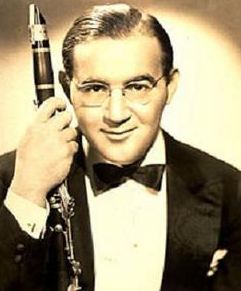The King of Swing – America’s First Rock Star
Benjamin David Goodman (1909-1986) was born in Chicago, the son of a Polish-Jewish father and Lithuanian-Jewish mother, immigrants who met in the U.S. Goodman took his first music lessons when he was 10 years old at the local synagogue. By 12, he made his professional debut (playing the clarinet) at Chicago’s Central Park Theater. At 16 he made his first recordings with the Ben Pollack Orchestra. He would go on to play alongside some of the most popular bands and most famous artists of the day. His own band would appear in a number of films, and on national radio. Despite the open racism and segregation of the time, Goodman began working with African-Americans, and is considered the first major American musician to have an interracial band (which meant he had to avoid playing concerts in the Southern states, where interracial bands were illegal). This was a key step in opening the door for more African-Americans to enter the mainstream music industry. By 1935, Goodman was one of the central forces that ushered in the “swing” era. In fact, he would be crowned the “King of Swing” (in addition to the “Rajah of Rhythm” and the “Patriarch of the Clarinet”). He is often credited with inspiring the start of the “dance craze”, and some consider him “America’s first rock star”. In 1962, Benny Goodman made history when he was sent to the USSR – the first American band on Soviet soil. The tour was designed to ease Cold War tensions, and was hailed a great success on both sides after 32 concerts, including for Soviet leader Nikita Khrushchev. It was a symbolic start of the process of reconciliation between the US and the USSR. Goodman was voted the best clarinetist multiple times, was inducted in the Jazz Hall of Fame, and awarded a Grammy for Lifetime Achievement. His fascinating story was immortalized in a major motion picture, The Benny Goodman Story.
Words of the Week
God would not have preserved our people for so long if we did not have another role to play in the history of mankind.
– Theodor Herzl

